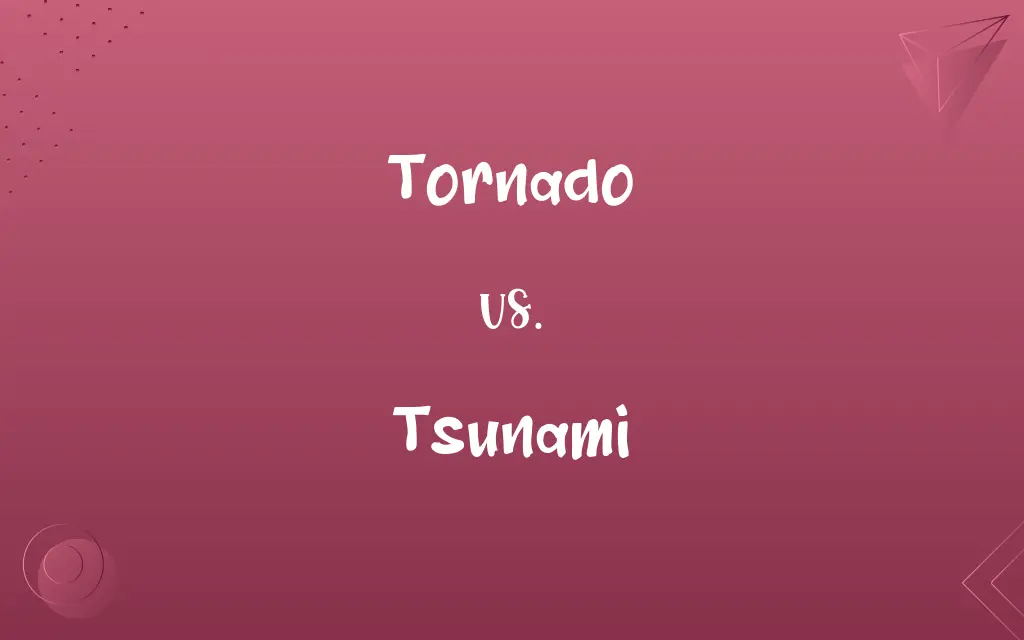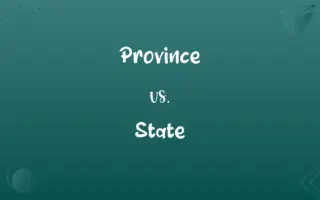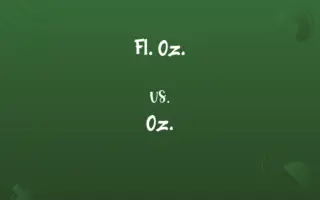Tornado vs. Tsunami: Know the Difference

By Shumaila Saeed || Updated on December 25, 2023
A tornado is a violently rotating column of air extending from a thunderstorm to the ground, while a tsunami is a series of ocean waves caused by underwater disturbances.

Key Differences
A tornado is formed from severe thunderstorms, characterized by a rotating funnel of air that extends from the storm clouds to the ground. A tsunami, in contrast, is generated by underwater disturbances like earthquakes, volcanic eruptions, or landslides, causing large, powerful waves in the ocean.
Shumaila Saeed
Nov 25, 2023
Tornadoes are visible as funnel-shaped clouds, often with a debris cloud at the base. Tsunamis, however, are not visible in the open ocean but become massive, surging waves as they approach the coast, often looking like rapidly rising tides.
Shumaila Saeed
Nov 25, 2023
Tornadoes mostly occur in land areas, particularly in regions like Tornado Alley in the United States. Tsunamis are ocean-based phenomena that affect coastal areas, with the potential to impact multiple countries and continents.
Shumaila Saeed
Nov 25, 2023
Tornadoes are short-lived, lasting from a few minutes to over an hour, but can cause significant destruction in a localized area. Tsunamis can travel across entire ocean basins, causing widespread destruction along coastlines hours after the triggering event.
Shumaila Saeed
Nov 25, 2023
Tornadoes can be predicted to some extent, allowing for short-term warnings. Tsunamis, once detected by seismic and oceanographic instruments, can be forecasted with tsunami warnings issued to potentially affected areas.
Shumaila Saeed
Nov 25, 2023
ADVERTISEMENT
Comparison Chart
Common Usage
Used to describe a specific weather event
Used to describe an oceanic phenomenon
Shumaila Saeed
Nov 25, 2023
ADVERTISEMENT
Tornado and Tsunami Definitions
Tornado
Tornadoes are produced by severe thunderstorms.
The severe storm spawned several tornadoes.
Shumaila Saeed
Nov 10, 2023
Tsunami
A tsunami is a series of large ocean waves.
The tsunami caused widespread flooding along the coast.
Shumaila Saeed
Nov 10, 2023
Tornado
A tornado is a rapidly rotating column of air.
The tornado tore through the countryside.
Shumaila Saeed
Nov 10, 2023
Tsunami
A tsunami is a natural disaster event.
A tsunami alert has been issued following the earthquake.
Shumaila Saeed
Nov 10, 2023
Tornado
Tornadoes are often seen as funnel-shaped clouds.
The tornado's funnel was clearly visible against the sky.
Shumaila Saeed
Nov 10, 2023
ADVERTISEMENT
Tsunami
Tsunamis have a significant impact on coastal regions.
The coastal village was devastated by the tsunami.
Shumaila Saeed
Nov 10, 2023
Tornado
Tornadoes are capable of causing extensive destruction.
The tornado destroyed several homes in its path.
Shumaila Saeed
Nov 10, 2023
Tsunami
Tsunamis are often triggered by underwater earthquakes.
An undersea earthquake triggered a massive tsunami.
Shumaila Saeed
Nov 10, 2023
Tornado
Tornadoes are violent weather phenomena.
A tornado warning was issued for the county.
Shumaila Saeed
Nov 10, 2023
Tsunami
Tsunamis can travel across ocean basins.
The tsunami traveled thousands of miles across the ocean.
Shumaila Saeed
Nov 10, 2023
Tornado
A violently rotating column of air extending from a cumulonimbus cloud to the ground, ranging in width from a few meters to more than a kilometer, with destructive winds up to 510 kilometers (316 miles) per hour or higher. Tornadoes are typically associated with a funnel cloud pendant from a storm's wall cloud, often extending to the bottom of the tornado.
Shumaila Saeed
Oct 19, 2023
Tsunami
A very large ocean wave caused by an underwater earthquake or volcanic eruption.
Shumaila Saeed
Oct 19, 2023
Tornado
A violent thunderstorm in western Africa or nearby Atlantic waters.
Shumaila Saeed
Oct 19, 2023
Tsunami
A very large and destructive wave, generally caused by a tremendous disturbance in the ocean, such as an undersea earthquake or volcanic eruption. Tsunami are usually a series of waves, or wave train.
Shumaila Saeed
Oct 19, 2023
Tornado
(meteorology) A violent windstorm characterized by a mobile, twisting, funnel-shaped cloud.
A tornado is a rotating column of air.
Shumaila Saeed
Oct 19, 2023
Tornado
A violent whirling wind; specifically (Meteorol.), a tempest distinguished by a rapid whirling and slow progressive motion, usually accompaned with severe thunder, lightning, and torrents of rain, and commonly of short duration and small breadth; a small cyclone.
Shumaila Saeed
Oct 19, 2023
Tornado
A localized and violently destructive windstorm occurring over land characterized by a funnel-shaped cloud extending toward the ground
Shumaila Saeed
Oct 19, 2023
Tornado
A purified and potent form of cocaine that is smoked rather than snorted
Shumaila Saeed
Oct 19, 2023
Repeatedly Asked Queries
What is a tornado?
A tornado is a violently rotating column of air extending from a thunderstorm to the ground.
Shumaila Saeed
Nov 25, 2023
What causes a tsunami?
Tsunamis are typically caused by underwater disturbances, such as earthquakes, volcanic eruptions, or landslides.
Shumaila Saeed
Nov 25, 2023
What areas are most affected by tsunamis?
Coastal areas, especially near tectonic plate boundaries, are most affected by tsunamis.
Shumaila Saeed
Nov 25, 2023
What are the signs of a tornado?
Signs of a tornado include a rotating funnel-shaped cloud, a loud roar, and debris.
Shumaila Saeed
Nov 25, 2023
How are tornadoes detected?
Tornadoes are detected through weather radar and visual observations.
Shumaila Saeed
Nov 25, 2023
Can tornadoes happen at sea?
Yes, tornadoes can occur at sea, where they are called waterspouts.
Shumaila Saeed
Nov 25, 2023
What is Tornado Alley?
Tornado Alley is a colloquial term for an area in the central United States where tornadoes are frequent.
Shumaila Saeed
Nov 25, 2023
What damage can tornadoes cause?
Tornadoes can cause significant damage, including destroying buildings and uprooting trees.
Shumaila Saeed
Nov 25, 2023
How fast can a tsunami travel?
Tsunamis can travel at speeds of up to 500 miles per hour (800 km/h) in open water.
Shumaila Saeed
Nov 25, 2023
Do tsunamis happen suddenly?
Tsunamis can occur suddenly with little warning, especially close to the earthquake epicenter.
Shumaila Saeed
Nov 25, 2023
How long does a tsunami last?
A tsunami can last for several hours, with waves arriving in a series.
Shumaila Saeed
Nov 25, 2023
Are tornadoes predictable?
Tornadoes are somewhat predictable, but their path and strength can be unpredictable.
Shumaila Saeed
Nov 25, 2023
Are all tsunamis large and destructive?
Not all tsunamis are large; some can be relatively small and cause minimal damage.
Shumaila Saeed
Nov 25, 2023
What is the difference between a tsunami and a tidal wave?
"Tidal wave" is a misnomer for tsunamis, which are not caused by tides but by underwater disturbances.
Shumaila Saeed
Nov 25, 2023
How do I stay safe during a tsunami?
To stay safe during a tsunami, evacuate to higher ground immediately upon hearing a warning.
Shumaila Saeed
Nov 25, 2023
Is there a scale for tornado intensity?
Yes, tornado intensity is often measured by the Enhanced Fujita Scale (EF Scale).
Shumaila Saeed
Nov 25, 2023
What season do tornadoes occur?
Tornadoes can occur any time of year, but are most common in spring and early summer.
Shumaila Saeed
Nov 25, 2023
What is a tsunami warning system?
A tsunami warning system uses seismic data and ocean monitoring to detect tsunamis and issue alerts.
Shumaila Saeed
Nov 25, 2023
Can tsunamis affect inland areas?
Tsunamis can affect inland areas if the waves travel far enough inland or up rivers.
Shumaila Saeed
Nov 25, 2023
Can tornadoes be stopped?
No, tornadoes cannot be stopped and must be waited out in a safe place.
Shumaila Saeed
Nov 25, 2023
Share this page
Link for your blog / website
HTML
Link to share via messenger
About Author
Written by
Shumaila SaeedShumaila Saeed, an expert content creator with 6 years of experience, specializes in distilling complex topics into easily digestible comparisons, shining a light on the nuances that both inform and educate readers with clarity and accuracy.































































